Overview
This article aims to provide parents with essential resources for free autism testing for toddlers, highlighting the crucial role of early detection and intervention.
Early detection can make a significant difference in a child's development, and understanding this can be comforting for parents navigating this journey.
One effective tool to consider is the M-CHAT, which is endorsed by the American Academy of Pediatrics. This screening tool empowers parents to assess their children at critical developmental stages, fostering a sense of agency and involvement in their child's growth.
Ultimately, utilizing such resources can lead to better support and outcomes for children with autism, ensuring they receive the care they need as early as possible.
We encourage parents to explore these resources and share their experiences, as together we can create a supportive community for all families affected by autism.
Introduction
Navigating the complexities of autism can feel overwhelming for parents, often filled with uncertainty and countless questions. As autism diagnoses continue to rise and early intervention becomes increasingly important, understanding the resources available for autism testing and support is essential.
From comprehensive screening tools like the Modified Checklist for Autism in Toddlers (M-CHAT) to community-driven initiatives that promote acceptance and inclusion, parents are empowered to take proactive steps in their child's developmental journey.
This article explores vital resources, guidelines, and strategies that equip families with the knowledge they need to advocate effectively for their children, ensuring timely assessments and access to crucial support services.
ASD Media: Comprehensive Resources for Autism Testing and Support
ASD Media serves as a vital resource for caregivers seeking comprehensive information about developmental evaluation and support. By offering a variety of tools, articles, and community insights, ASD Media helps parents navigate the complexities of assessments related to developmental disorders.
Their commitment to fostering a supportive environment ensures that families have access to the latest information and strategies for effective screening and intervention. Community collaboration is essential; diverse perspectives can lead to a remarkable 48% increase in creativity within collaborative groups, ultimately resulting in enhanced support initiatives for individuals with developmental disorders.
Additionally, the case study titled 'How ABA Therapy Can Help Manage Fear and Phobias' highlights the practical benefits of ABA therapy in addressing specific challenges faced by young individuals with developmental disorders. Temple Grandin's insight that 'this condition provides a special opportunity to see things in new ways' resonates deeply with many parents, underscoring the unique perspectives that children with this condition can bring.
Moreover, events like the Autism Speaks Celebrity Chef Gala showcase ongoing community initiatives that promote acceptance and inclusion, reinforcing the importance of community support in improving screening outcomes for individuals with developmental disorders. We invite you to engage with these resources and share your experiences, as together we can create a more supportive environment for all families.
M-CHAT: A Reliable Screening Tool for Autism in Toddlers
The Modified Checklist for Autism in Toddlers (M-CHAT) is an invaluable resource for parents, as it offers a free autism test for toddlers through a parent-completed questionnaire designed to screen for developmental disorders. This comprehensive tool, which acts as a free autism test for toddlers, consists of 20 targeted questions that assess various behaviors and developmental milestones, making it essential for early detection. The American Academy of Pediatrics endorses the M-CHAT, recommending its use during well-child visits at 18 and 24 months of age. This proactive approach empowers parents to receive immediate results from a free autism test for toddlers, which can be crucial in determining whether further evaluation is needed.
Recent discussions highlight the importance of early evaluations, with pediatricians emphasizing that timely assessments can significantly influence developmental outcomes. While the American Academy of Pediatrics has advocated for universal, standardized evaluations at 18- and 24-month well-child visits for nearly two decades, there remains a gap in community application, falling short of optimal practices. This underscores the need for parents to utilize tools like the M-CHAT to ensure their children receive the support they deserve.
Statistics indicate that the M-CHAT assessment tool is effective as a free autism test for toddlers, with research showing its ability to accurately identify children at risk for autism, leading to earlier interventions. For example, funding from the Health Resources and Services Administration has supported the development and implementation of such screening tools. Real-world stories illustrate its application across various settings, demonstrating how caregivers have successfully engaged with healthcare providers about their children’s development using the M-CHAT. By embracing these resources, parents can play a vital role in their children’s journey toward receiving appropriate support and services. Furthermore, fostering self-acceptance is crucial for the well-being and happiness of individuals on the spectrum, ultimately contributing to a more inclusive society.
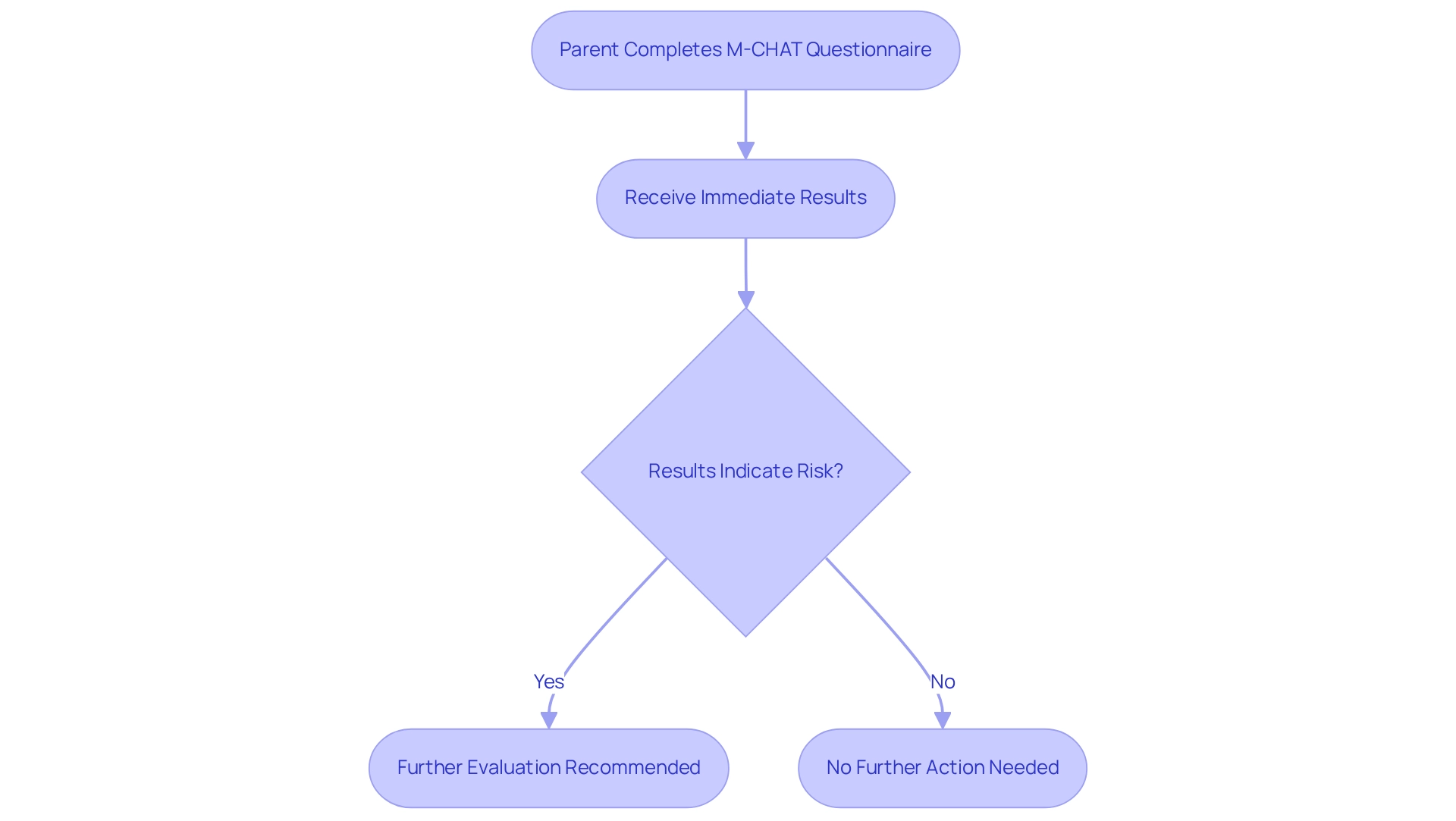
CDC Guidelines: Trusted Standards for Autism Screening
The Centers for Disease Control and Prevention (CDC) recommends that all children receive a free autism test for toddlers during their wellness visits at 18 and 24 months to screen for developmental disorders. This guidance underscores the importance of early identification and intervention, which can significantly improve outcomes for children facing developmental challenges. Did you know that recent statistics reveal children born in 2018 are 15% more likely to receive an autism diagnosis by age four compared to those born in 2014? This statistic highlights the growing need for effective evaluation practices.
As a parent, it's crucial to discuss any concerns you may have with your healthcare provider to ensure timely evaluations, particularly regarding a free autism test for toddlers. Engaging in proactive dialogue can lead to better support for your child. Effective early detection initiatives, such as those highlighted in the case study 'Need for Sustained Investment in Autism Research,' demonstrate that a free autism test for toddlers can lead to enhanced resources for children and their families.
With autism diagnosis rates continuing to rise—reportedly increasing by 10% over the past five years—the importance of adhering to the latest CDC guidelines becomes ever more apparent. Staying informed is key. Parents can sign up for email updates regarding ASD information, which not only keeps you engaged but also reinforces the necessity of ongoing investment in research and early intervention strategies. Together, we can navigate this journey and ensure our children receive the support they need.
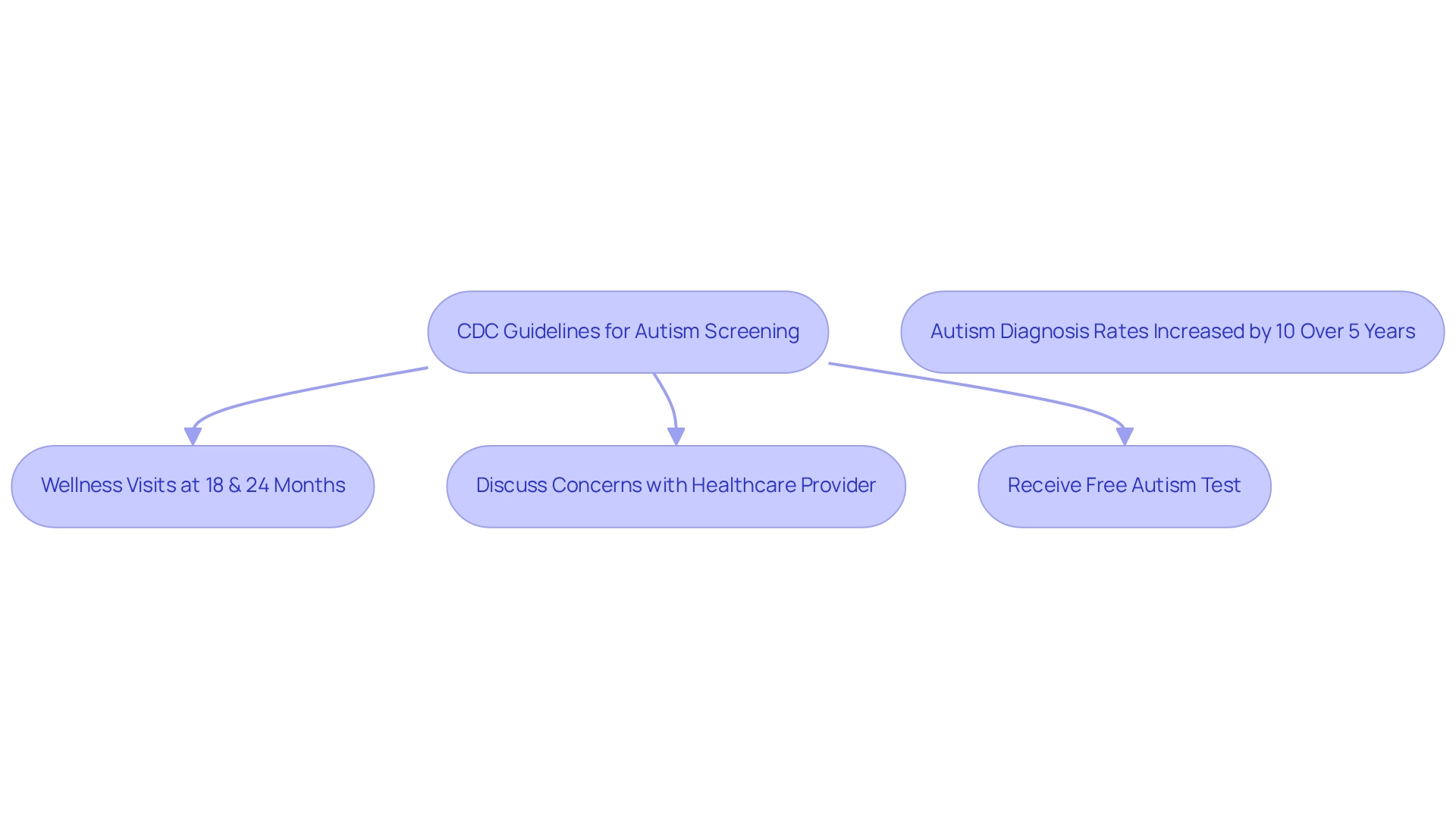
Autism Society: Supportive Resources for Diagnosis and Screening
The Autism Society provides a wealth of resources, including a free autism test for toddlers, to assist families during the diagnosis and assessment journey. Their website is a treasure trove of screening tools, including a free autism test for toddlers, local support groups, and educational materials, all tailored to meet the unique needs of families. By connecting families to these vital resources, the Autism Society fosters a more informed and compassionate community for those affected by autism. Remarkably, nearly 25% of school-age individuals with autism demonstrate positive growth across all areas by age 10, highlighting the critical importance of early intervention and support.
Moreover, case studies indicate that combining survey data with administrative claims data can yield deeper insights into the experiences of the autistic community. This approach ultimately enhances advocacy efforts and informs necessary policy changes. The Autism Society's commitment to empowering families through accessible resources is crucial in navigating the complexities of diagnosis and support associated with autism. As one study poignantly concludes, "doing well is possible even when a child continues to meet the criteria for ASD."
Additionally, the Autism by the Numbers Dashboard emphasizes the transition from school to adult life, showcasing the long-term support available for families. Support groups play an invaluable role in the diagnosis and screening of developmental disorders by offering a free autism test for toddlers and providing essential assistance to those in need. Looking ahead to 2025, the Autism Society remains dedicated to updating its resources, ensuring that families have access to the latest support available. Together, we can create a nurturing environment where every family feels supported and understood.
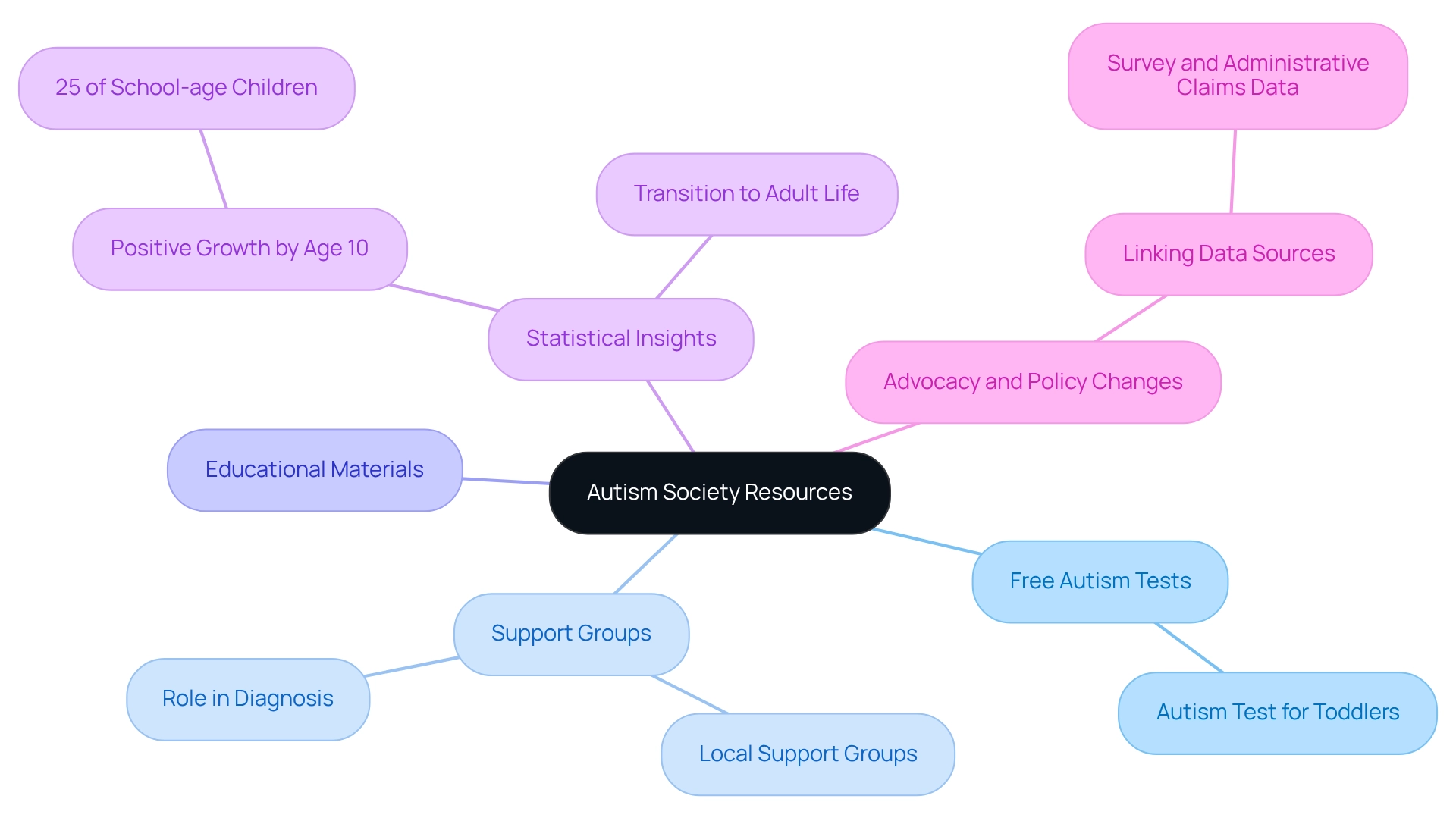
Recognizing Early Signs of Autism: Key Indicators for Parents
As parents, your role in identifying the early signs of autism in your toddlers is incredibly important, especially when considering a free autism test for toddlers. You may notice key indicators such as:
- Limited eye contact
- A lack of response when called by name
- Delayed speech development
- Repetitive actions
- A strong preference for routines
These behaviors can raise potential concerns. Research shows that 78.8% of school-age autistic individuals make progress in at least one developmental area by age 10, highlighting the critical nature of early identification and intervention.
Many parents have shared success stories, illustrating that prompt assessments and assistance can lead to significant advancements in their children's development. In fact, surveys indicate that 36.5% of autism caregivers utilize ABA therapy, with a majority reporting positive outcomes. This underscores the importance of seeking evaluations and interventions as early as possible.
Moreover, a recent study suggests that a substantial number of autistic youths face comorbid conditions, such as anxiety and ADHD. This emphasizes the need for comprehensive support systems to address these challenges effectively. By staying vigilant and informed about these early signs, you can take proactive steps to seek evaluations and interventions, such as a free autism test for toddlers, ultimately unlocking your child's potential and enhancing their developmental journey.
Consulting with Board-Certified Behavior Analysts (BCBAs) can provide tailored support and guidance for families navigating these early signs. Remember, you are not alone in this journey, and there are resources available to help you every step of the way.
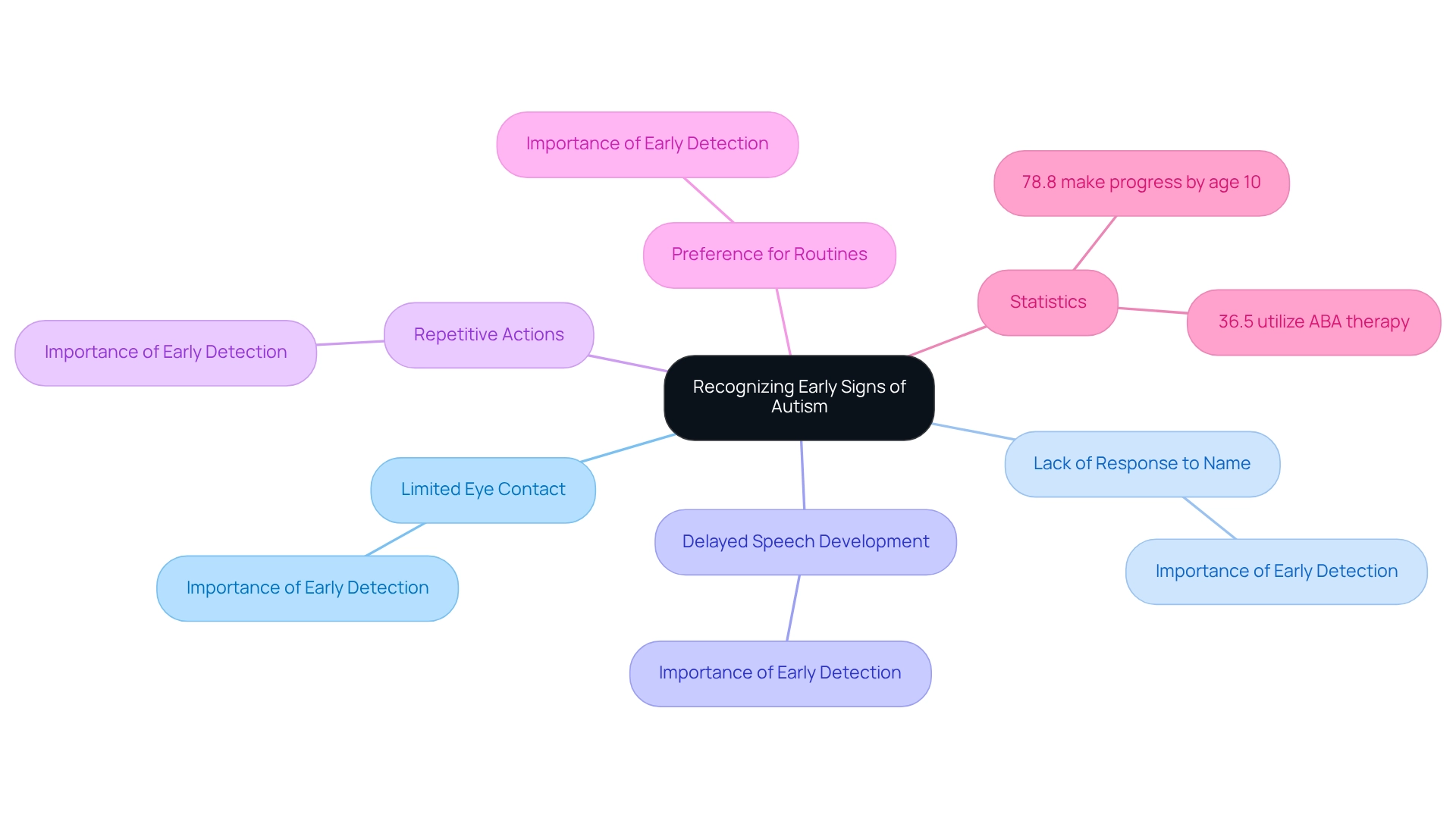
Developmental Monitoring: A Critical Component of Autism Screening
Developmental monitoring is an essential practice that involves tracking a young one's growth and behavior over time, ensuring they are meeting typical developmental milestones. This proactive strategy is crucial for the early detection of potential delays or issues, particularly concerning developmental disorders. Engaging in regular conversations with healthcare providers about a young one's development can greatly enhance the likelihood of timely screenings and interventions.
Recent statistics reveal that individuals born in 2018 were more likely to be diagnosed with developmental disorders by age four compared to those born in 2014. This highlights the importance of careful observation. Experts emphasize that support for autistic individuals should span a lifetime, underscoring the necessity for ongoing developmental assessments.
As HHS Secretary Robert F. Kennedy, Jr. poignantly remarked, "We should have had these answers 20 years ago," reflecting a growing recognition of the need for comprehensive understanding and support in this area. By embracing effective strategies for developmental monitoring in early childhood—like maintaining open communication with healthcare providers and utilizing available resources—guardians can play a crucial role in facilitating their offspring's developmental journey. This ensures that children receive the necessary support as early as possible.
![]()
Ongoing Assessments: Ensuring Continuous Support for Autism
Continuous evaluations are vital for children diagnosed with autism, as they ensure that support and intervention strategies remain effective and adaptable to the individual’s changing needs. Frequent assessments not only help in recognizing new challenges but also empower caregivers and professionals to adjust their methods as necessary. This proactive approach is essential for nurturing the individual’s overall development and well-being.
Research shows that early intervention can lead to significant improvements in communication and social skills, highlighting the importance of ongoing monitoring. Moreover, experts stress that a diagnosis should be informed by various sources and clinical judgment, rather than relying solely on autism-specific diagnostic tools. Catherine Lord, a Professor of Human Development and Psychology at UCLA, emphasizes that this comprehensive approach is crucial for supporting the strengths and challenges autistic individuals face daily.
For example, a study by Crane et al. (2016) surveyed over 1,000 parents about their experiences with developmental disorder diagnosis, revealing the complexities involved in understanding each individual’s unique profile. Additionally, case studies, such as 'Positive Parenting for Children with Autism,' demonstrate that personalized support can significantly enhance development across various life domains.
By prioritizing continuous evaluations, families can ensure that their approaches evolve over time, ultimately leading to more effective interventions and improved outcomes for individuals on the spectrum.
Understanding Autism Symptoms: A Guide for Parents
Identifying the signs of developmental disorders is vital for guardians as they support their children's growth journey. Common indicators include:
- Difficulties in social interactions
- Challenges in communication
- Patterns of restricted or repetitive behaviors
By understanding these symptoms, parents can effectively advocate for their children's needs and seek appropriate interventions.
Statistics reveal disparities in the prevalence of these conditions among different demographics. For instance, Hispanic youth experience a 1.8 times higher rate compared to non-Hispanic White youth, while non-Hispanic Black youth face a 1.6 times higher rate. This underscores the importance of awareness and understanding across diverse communities, as highlighted by the CDC.
Real-life examples illustrate how awareness of symptoms can enhance advocacy. Parents who are informed about the characteristics of developmental disorders often feel better equipped to navigate educational and healthcare systems, ensuring their children receive the necessary support. Additionally, understanding the typical costs of prevalent services—such as developmental screenings averaging $165.95—can help guardians prepare for the financial aspects of care.
Experts emphasize that early identification of developmental disorder symptoms can lead to timely interventions, significantly improving outcomes. Child psychologists advocate for a proactive approach, encouraging caregivers to familiarize themselves with typical symptoms to bolster their advocacy efforts. Furthermore, medications like aripiprazole and risperidone have received FDA approval for addressing irritability linked to developmental disorders, providing caregivers with treatment options to consider.
A case study on the family impact of developmental disorders reveals that having a child with such a condition affects the entire family unit, necessitating attention to the physical and emotional well-being of all members. This holistic perspective is essential for fostering a supportive environment that nurtures growth and well-being. ASD Media's commitment to promoting collaboration and development in the ABA therapy sector further aids families in navigating these challenges.
By staying informed about the symptoms of developmental disorders and supporting their children, parents can play a crucial role in unlocking their children's potential and managing the complexities of care.
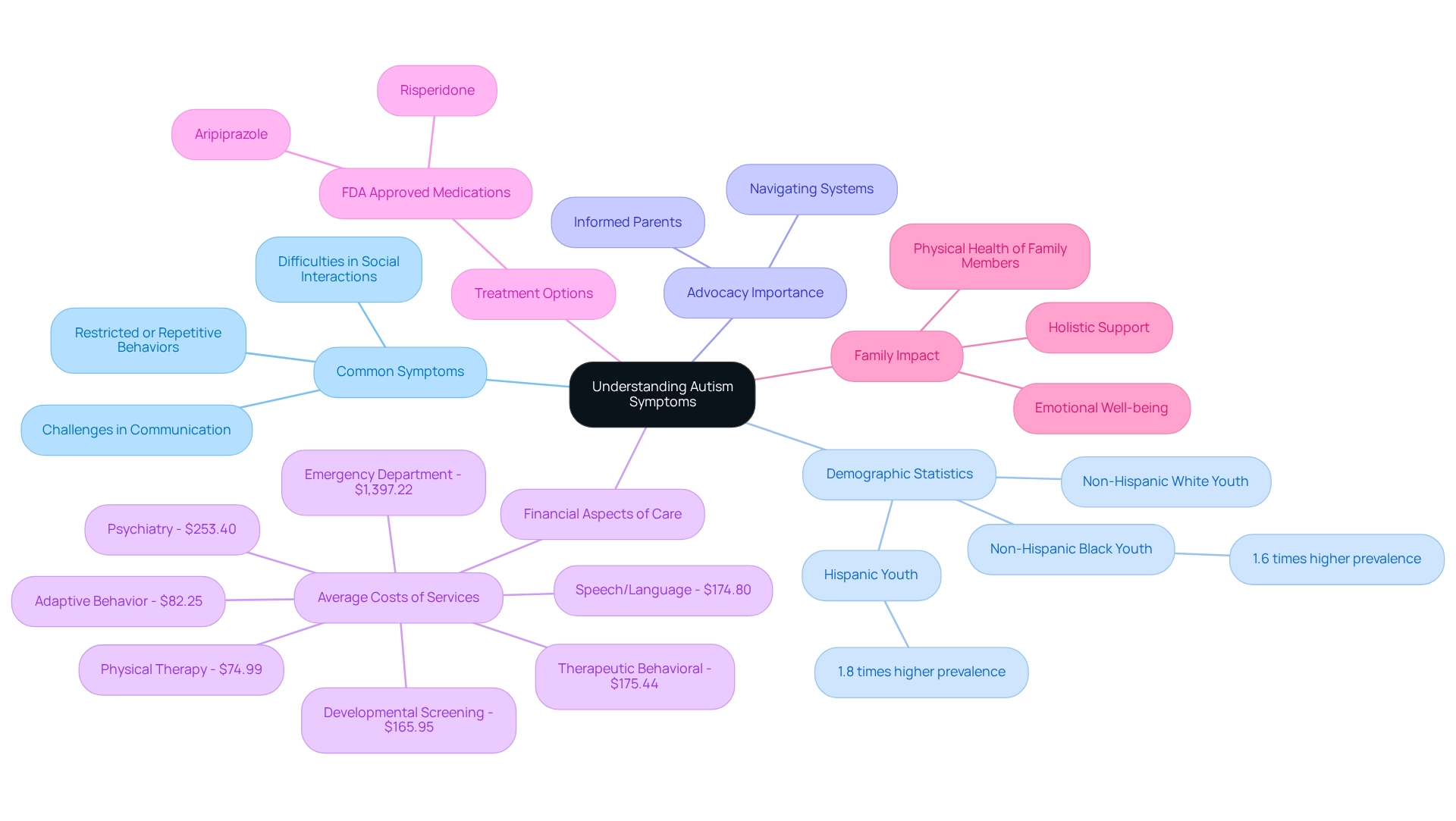
Free Screening Resources: Accessible Options for Autism Testing
Parents seeking to understand their child's risk for autism can find several valuable resources, including a free autism test for toddlers, at their fingertips. Websites such as Autism Speaks and the CDC provide online assessment tools, including the well-known M-CHAT and various questionnaires. These resources empower guardians to identify potential issues early, guiding them toward further assessment when necessary. Importantly, if strong evidence of a developmental disorder emerges during the evaluation, guardians may be advised to skip the consultation and proceed directly to a formal assessment.
Recent statistics reveal that a significant number of parents are utilizing these free evaluation tools, reflecting a growing awareness of the importance of developmental disorder risk assessment. Studies show that effective early assessments can lead to positive developmental outcomes; by middle childhood, 78.8% of autistic children exhibit progress in at least one developmental area. This highlights the critical role of early detection and intervention.
Moreover, professional insights underscore the effectiveness of online evaluation tools in identifying developmental disorders. While these evaluations do not provide a formal diagnosis, they serve as a crucial first step in the assessment journey. As Dr. Judy Eaton, a clinical director, notes, 'While this evaluation is complimentary, it does not offer a diagnosis.' Understanding this distinction is essential for caregivers navigating the assessment landscape.
In 2025, the availability of a free autism test for toddlers continues to expand, providing caregivers with vital tools for autism risk assessment. These resources not only help guardians identify potential issues but also encourage a proactive approach to their child's developmental well-being. It's also worth noting that private diagnostic assessments are available, albeit at a cost, with the average expense for therapeutic behavioral services in the U.S. being $175.44. This context further emphasizes the value of free evaluation resources for families. Success stories from caregivers who have used these free autism tests for toddlers illustrate their effectiveness and the positive impact they can have on early intervention.
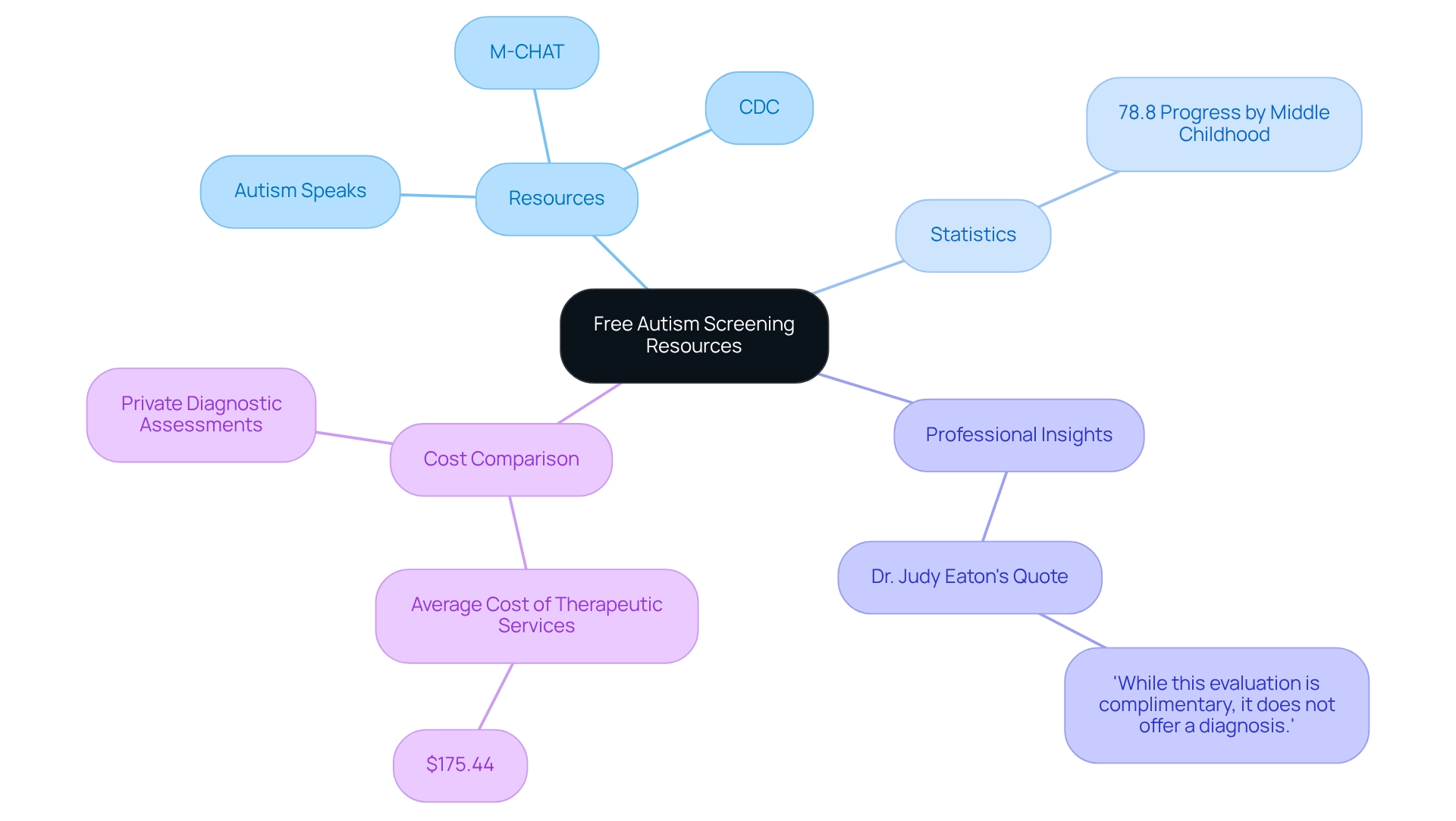
Next Steps After Screening: Navigating the Autism Diagnosis Process
After an autism screening, it's crucial for guardians to engage in a heartfelt conversation about the results with their healthcare provider. This discussion serves as a vital step in determining the next actions, which often include a thorough evaluation by a specialist. These evaluations typically involve developmental assessments and behavioral observations, tailored to meet the unique needs of the individual. Understanding this diagnostic process not only equips guardians with essential information but also empowers them to advocate effectively for their child.
Statistics reveal that a significant number of parents—around 70%—take proactive steps after receiving assessment results, often seeking additional evaluations. Yet, only about 50% of parents discuss these results with healthcare providers, highlighting a concerning gap in communication that can affect the diagnostic journey. Alarmingly, the prevalence of developmental disorders has risen to 1 in 31 children in the U.S. as of April 15, 2025, underscoring the urgent need for timely screenings and follow-up measures.
Real-life stories emphasize the importance of this dialogue. For instance, a case study on employment outcomes for individuals with developmental disorders highlights how early intervention and support services can significantly enhance long-term success. The study found that nearly 60% of individuals with autism gained employment after receiving vocational rehabilitation services, showcasing the advantages of informed decision-making following an autism diagnosis. The researchers noted, 'thriving is achievable even when a young one continues to meet the criteria for ASD,' providing reassurance to guardians navigating this complex process.
Experts suggest that parents approach these conversations with specific questions and concerns, such as inquiring about the implications of the screening results, the necessary evaluations, and available resources. This proactive engagement can profoundly influence their child's developmental trajectory and access to essential support. Additionally, it's vital to recognize the unique experiences of girls with autism, as their diagnostic journeys may differ from those of boys, emphasizing the need for tailored approaches in discussions with healthcare providers.
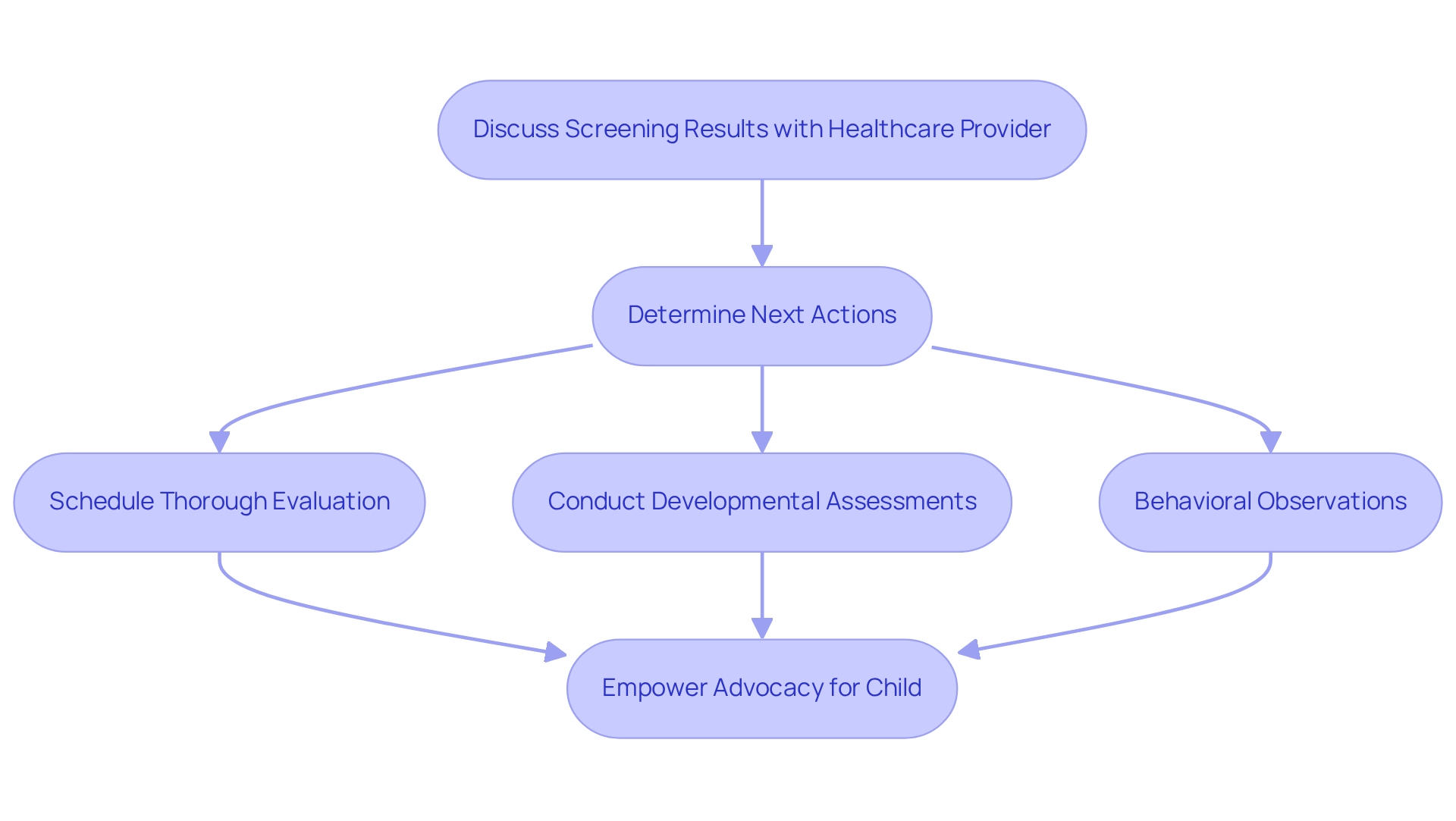
Conclusion
Access to accurate autism testing and support resources is crucial for parents navigating the complexities of autism spectrum disorder. This article highlights several key tools and organizations, such as the Modified Checklist for Autism in Toddlers (M-CHAT) and the Autism Society, which empower families to take proactive steps in identifying and addressing autism early on. By utilizing these resources, parents can ensure timely assessments and interventions that significantly improve developmental outcomes for their children.
The importance of community support and collaboration cannot be overstated. These elements enhance the effectiveness of autism screening and intervention initiatives. Engaging with local support groups and participating in community events fosters a sense of belonging and understanding among families. It reinforces the message that they are not alone in this journey. Insights from experts and real-life success stories remind us that early recognition and intervention can lead to meaningful progress, enabling children with autism to thrive.
Ultimately, staying informed and advocating for a child's needs is vital in unlocking their potential. As autism diagnoses continue to rise, it is imperative for parents to utilize available screening tools, engage in ongoing assessments, and maintain open communication with healthcare providers. By doing so, families can navigate the autism diagnosis process with confidence, ensuring that their children receive the support and resources necessary for a fulfilling and successful life.
Frequently Asked Questions
What is ASD Media and what resources does it provide?
ASD Media is a vital resource for caregivers seeking comprehensive information about developmental evaluation and support. It offers a variety of tools, articles, and community insights to help parents navigate assessments related to developmental disorders.
How does community collaboration impact support for individuals with developmental disorders?
Community collaboration can lead to a remarkable 48% increase in creativity within collaborative groups, which ultimately enhances support initiatives for individuals with developmental disorders.
What is the M-CHAT and how is it used?
The Modified Checklist for Autism in Toddlers (M-CHAT) is a free autism screening tool designed for toddlers, consisting of 20 targeted questions that assess various behaviors and developmental milestones. It is recommended by the American Academy of Pediatrics to be used during well-child visits at 18 and 24 months of age.
Why is early evaluation important for children regarding autism?
Early evaluations can significantly influence developmental outcomes. Timely assessments help in identifying children at risk for autism, leading to earlier interventions and better support.
What are the CDC guidelines for autism screening?
The CDC recommends that all children receive a free autism test for toddlers during their wellness visits at 18 and 24 months to screen for developmental disorders, emphasizing the importance of early identification and intervention.
What recent statistics highlight the need for effective autism evaluation practices?
Children born in 2018 are 15% more likely to receive an autism diagnosis by age four compared to those born in 2014, indicating a growing need for effective evaluation practices.
How can parents engage with healthcare providers about their child's development?
Parents should discuss any concerns they have with their healthcare provider to ensure timely evaluations and better support for their child, especially regarding the use of screening tools like the M-CHAT.
What role does self-acceptance play for individuals on the autism spectrum?
Fostering self-acceptance is crucial for the well-being and happiness of individuals on the spectrum, contributing to a more inclusive society.




